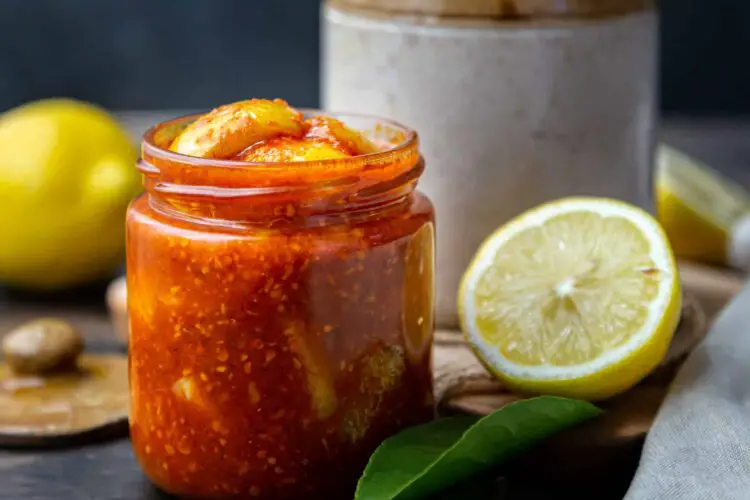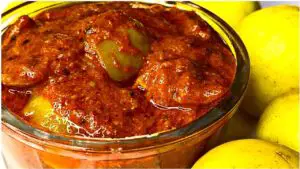Nimbu ka achar or Lemon pickle is an Indian-spiced pickled relish recipe made by combining lemons with aromatic Indian spices.
With your favorite Indian cuisine, this ridiculously simple and oil-free lemon pickle recipe provides the most vibrant and zesty condiment. Only some basic ingredients are needed to make a homemade spiced lemon pickle, which is also naturally low in fat, gluten-free, and vegan-friendly
The flavor of Nimbu ka achar or lemon pickle is distinctive because it blends the sourness of lemons and mustard seeds with a light heat from the chili powder and sweetness from the sugar. Fenugreek seeds’ bitterness balances the sourness, while salt brings out the flavors of everything.
Nimbu ka achar is a traditional Indian pickle that is made with lemons, salt, and a blend of various spices. It is a popular condiment in Indian cuisine and is often served as a side dish with meals. The sourness of the lemons is balanced with the heat and spice of the spices, resulting in a flavorful and tangy pickle.
The preparation method for nimbu ka achar can vary depending on the region and personal preference, but the basic ingredients remain the same. Some recipes may include additional ingredients such as garlic, ginger, or cumin seeds to add more flavor.
In addition to its delicious taste, nimbu ka achar is also known for its health benefits. Lemons are rich in vitamin C, which is essential for maintaining a healthy immune system. The spices used in the pickle are also known to have medicinal properties and can aid in digestion and other health issues.
Nimbu ka achar can be stored for several months if kept in an airtight container in a cool and dry place. It is a versatile condiment that can be enjoyed with a variety of dishes, such as rice, dal, curries, and even sandwiches.
Health benefits for Nimbu ka achar recipe
- Rich in Vitamin C: Lemons are a great source of vitamin C, which is important for maintaining a healthy immune system. Nimbu ka achar made with lemons can provide a good amount of this essential vitamin.
- Digestive Aid: The spices used in nimbu ka achar, such as mustard seeds, fenugreek seeds, and fennel seeds, are known to have digestive properties. Consuming this pickle may help to promote healthy digestion and ease digestive discomfort.
- Anti-inflammatory: Many of the spices used in nimbu ka achar, such as turmeric, are known for their anti-inflammatory properties. This means that consuming this pickle may help to reduce inflammation in the body and potentially lower the risk of chronic diseases.
- Antimicrobial: The combination of salt and spices used in nimbu ka achar can create an environment that is unfriendly to harmful bacteria and microorganisms. This can help to preserve the pickle and also offer potential health benefits.
Ingredients of Nimbu ka achar (Lemon Pickle)
- 1 Kg Lemons (washed and wiped), chopped
- 150 gram Salt
- 100-gram Kashmiri red chili powder
- 50-gram Fenugreek seeds (finely ground)
- 3 tbsp Turmeric powder
- 1 cup oil
- 4 tsp mustard seed
- 1 tsp hing /asafoetida
Instruction for Nimbu ka achar (Lemon Pickle)
- Clean and dry lemons. Your Instant Pot’s steel insert should be filled with water before you set a trivet inside. Any oven-safe bowl that has lemons in it should be set on top of the trivet. Lemons should be pressure-cooked at high pressure for 10 minutes.
- When the pin lowers, open the lid after allowing the pressure to naturally relax.
- Remove the lime from the water now and pat it dry. Lime should not contain any moisture as this would reduce the shelf life of the pickles.
- chop into quarter pieces and keep aside.
- 4 teaspoons of mustard and 50 gm of Fenugreek seeds (Methi) are dry roasted in a skillet over a low temperature until fragrant.
- blend to a fine powder and add to chopped limes.
- also, add Kashmiri red chili powder, turmeric, and salt.
- Make careful to thoroughly combine everything by mixing.
- In a separate tempering pan, add the remaining 1 cup of oil. When the oil is hot, add the mustard seeds, fenugreek seeds, and hing. Let the mustard seeds splutter. Turn off the heat and add it to the pickle.
- Mix it well and let it cool before storing it in an air-tight container.
Serving Suggestions:
It’s a great way to add flavor to any dish. A few of my favorite combinations are Dal-Rice with pickle and salad. Aloo Paratha or for that matter any Partha with pickle and yogurt. Sabzi roti and pickle. Pulav and pickle. Last but not least try adding a layer of this pickle to your cheese sandwich or simple bread butter.
Storage suggestions
To reduce contamination and spoilage, I would advise moving apart into a smaller container large enough to last for a few days. Use a dry, clean spoon each and every time.
Although we utilized preservatives like oil and salt to keep this pickle from spoiling, it is not created in the manner that is customary, so we must take these measures.
This pickle will keep for weeks or months if you follow these instructions, depending on how much you eat.
Tips and Variations
- First, check the lime for moisture because it shortens the shelf life of pickles.
- Watch the spices carefully as they are toasted to prevent burning.
- Even while the fried pickle peel may still be a bit crunchy now, it will only get softer and better with time!
- Instant lime pickle, also known as Nimbu ka achar, is delicious when the tanginess and spice are well-balanced.
- Use clean and dry glass jars for pickling always. Reuse jam bottles, I always do.
FAQs
- Is a lemon pickle healthy?
If consumed in moderation, lemon pickles encourage good gut flora, aid in blood circulation, and are rich in vital minerals including iron, copper, calcium, potassium, and other elements. Because it is high in vitamin C, it also strengthens the immune system.
- What is the best way to eat lemon pickle?
Several Indian dishes go well with lemon pickles. The ideal accompaniments for it are dal and rice, paratha, or even steaming idli.
- Why are my lemon pickles so bitter?
The pickle will taste bitter if the lemon seeds are left in during cooking. After cooking the lemons, take out all the seeds to avoid that.
- Do you eat the pickle’s skin?
Yes. Cooking aids in making the peel edible by softening it. The bitterness of the rind is diminished and given a pleasant flavor by salt, spices, and sugar.
Nimbu ka achar recipe A Tangy Delight to Tantalize Your Taste Buds
Nimbu ka achar or Lemon pickle is an Indian-spiced pickled relish recipe made by combining lemons with aromatic Indian spices.
Ingredients
- 1 Kg Lemons (washed and wiped), chopped
- 150 gram Salt
- 100-gram Kashmiri red chili powder
- 50-gram Fenugreek seeds (finely ground)
- 3 tbsp Turmeric powder
- 1 cup oil
- 4 tsp mustard seed
- 1 tsp hing /asafoetida
Instructions
- Clean and dry lemons. Your Instant Pot’s steel insert should be filled with water before you set a trivet inside. Any oven-safe bowl that has lemons in it should be set on top of the trivet. Lemons should be pressure-cooked at high pressure for 10 minutes.
- When the pin lowers, open the lid after allowing the pressure to naturally relax.
- Remove the lime from the water now and pat it dry. Lime should not contain any moisture as this would reduce the shelf life of the pickles.
- chop into quarter pieces and keep aside.
- 4 teaspoons of mustard and 50 gm of Fenugreek seeds (Methi) are dry roasted in a skillet over a low temperature until fragrant.
- blend to a fine powder and add to chopped limes.
- also, add Kashmiri red chili powder, turmeric, and salt.
- Make careful to thoroughly combine everything by mixing.
- In a separate tempering pan, add the remaining 1 cup of oil. When the oil is hot, add the mustard seeds, fenugreek seeds, and hing. Let the mustard seeds splutter. Turn off the heat and add it to the pickle.
- Mix it well and let it cool before storing it in an air-tight container.
Notes
- First, check the lime for moisture because it shortens the shelf life of pickles.
- Watch the spices carefully as they are toasted to prevent burning.
- Even while the fried pickle peel may still be a bit crunchy now, it will only get softer and better with time!
Nutrition
| Calories | 37kcal |
| Fat | 1g |
| Sodium |
195mg
|
| Potassium |
7mg
|
| Carbohydrates | 6g |
| Protein | 9g |
| Vitamin A |
35IU
|
| Calcium |
0.2mg
|
| iron | 0.2mg |
You Might Also Like:
follow us on instagram, facebook and youtube



